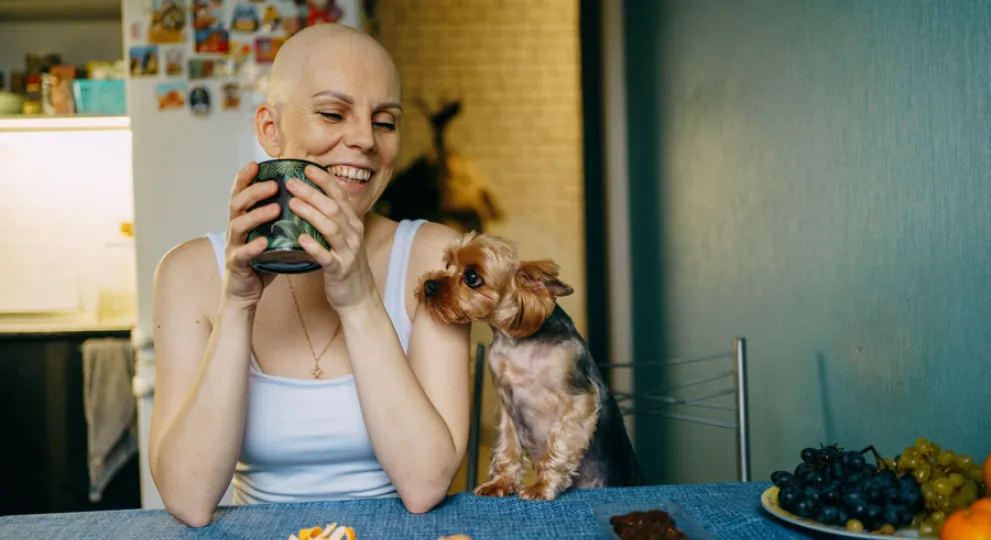Self-Care Isn’t Selfish — It’s Essential
Self-Care Isn’t Selfish — It’s Essential

When you think of self-care, what comes to mind? Do you think of bubble baths, spa vacations and beauty products?
Sometimes self-care can seem self-indulgent. But consider this: self-care is just what it sounds like – taking care of yourself. And when you’re living with cancer, taking care of your body, mind and spirit is important.
If you struggle with self-care or aren’t sure where to start, here are some things that might help you.
What to know about self-care
Self-care is deeply personal.
Everyone is unique, and everyone’s cancer journey is different. This means that your idea of self-care may not look like someone else’s. If your version of self-care is bubble baths, getaways, and beauty products, that’s ok. What matters is that it makes you feel good. That may be something as simple as making time to read a book, a few minutes outside gardening, or listening to your favorite music.
Self-care may help you take back some control.
When you’re living with cancer, a lot of what’s going on in your life may be beyond your control. Self-care may help you take back control in small but meaningful ways. You may not be able to choose your treatment schedule, for instance, but you can be thoughtful about trying to get enough sleep, eating healthy foods, and setting boundaries.
New rituals and routines may help you build self-care into your life.
In general, creating rituals can be an effective way to reduce anxiety and stress associated with uncertainty. And some cancer patients find that self-care activities help preserve their sense of normality and self-identity. Check out another resource on the topic called ‘Guilt is a common emotion when living with cancer. Here are ways to help cope with it.’
Knowing more about your cancer may help you take better care of yourself.
Understanding your diagnosis can help you make decisions about your health. Experts call this health literacy. Lower health literacy may be linked with lower quality of life and poorer health outcomes. You don’t have to become an expert, but learning, reading, and asking questions about your cancer may help you feel more informed and discover self-care practices that work for you.
Microsteps that may help with self-care
Here are some small, actionable steps called Microsteps that you may consider taking to create a self-care routine that works for you. As always, speak to your care team if you have any questions or concerns about self-care practices.
Making a list of activities that bring you joy.
You know the things you like, but have you ever taken the time to write them down? Let yourself write down the things that give you joy, without judgment. They can be big things, like a trip to a favorite vacation destination. Or they can be small things, like taking a morning walk, watching a TV show or movie that you enjoy, or listening to a certain song. After writing your list, look it over and consider choosing at least one activity you want to make time for each day.
Trying something you’ve always wanted to do.
Try making a list of books you’ve always wanted to read, movies you’ve always wanted to see, or recipes you’ve wanted to make. Try to get through the list one-by-one.
Finding a self-care partner.
If you struggle with asking for what you need or sticking with a self-care routine, consider asking someone you trust to check in with you regularly and give you gentle nudges or reminders. If you want to, you can give them specific areas to check in about where you know you need support. For example, getting to bed by a certain time, making time for movement, or staying connected with friends and family.
Adopting a new habit that makes your life easier.
Consider using paper plates so you don’t have to wash dishes. And if it fits your budget, try outsourcing tasks, like having groceries delivered or hiring help for cleaning or yard work. Or simply saying no to something non-essential that tires you out or doesn’t bring you joy.
Schedule regular learning time to boost your health literacy.
Try dedicating 15 minutes each day to read about your specific type of cancer from reliable sources. This can include patient guides from cancer organizations, research articles, stories of people who have had your type of cancer, or reputable websites.
Create a list of questions for your care team.
Consider this as another way to boost your health literacy. Before each appointment, write down any questions — even just one — about your diagnosis, treatment, or side effects. This practice can help you plan ahead, reduce stress, get the information you need, and feel more in control of your care.
Developed with Thrive Global













